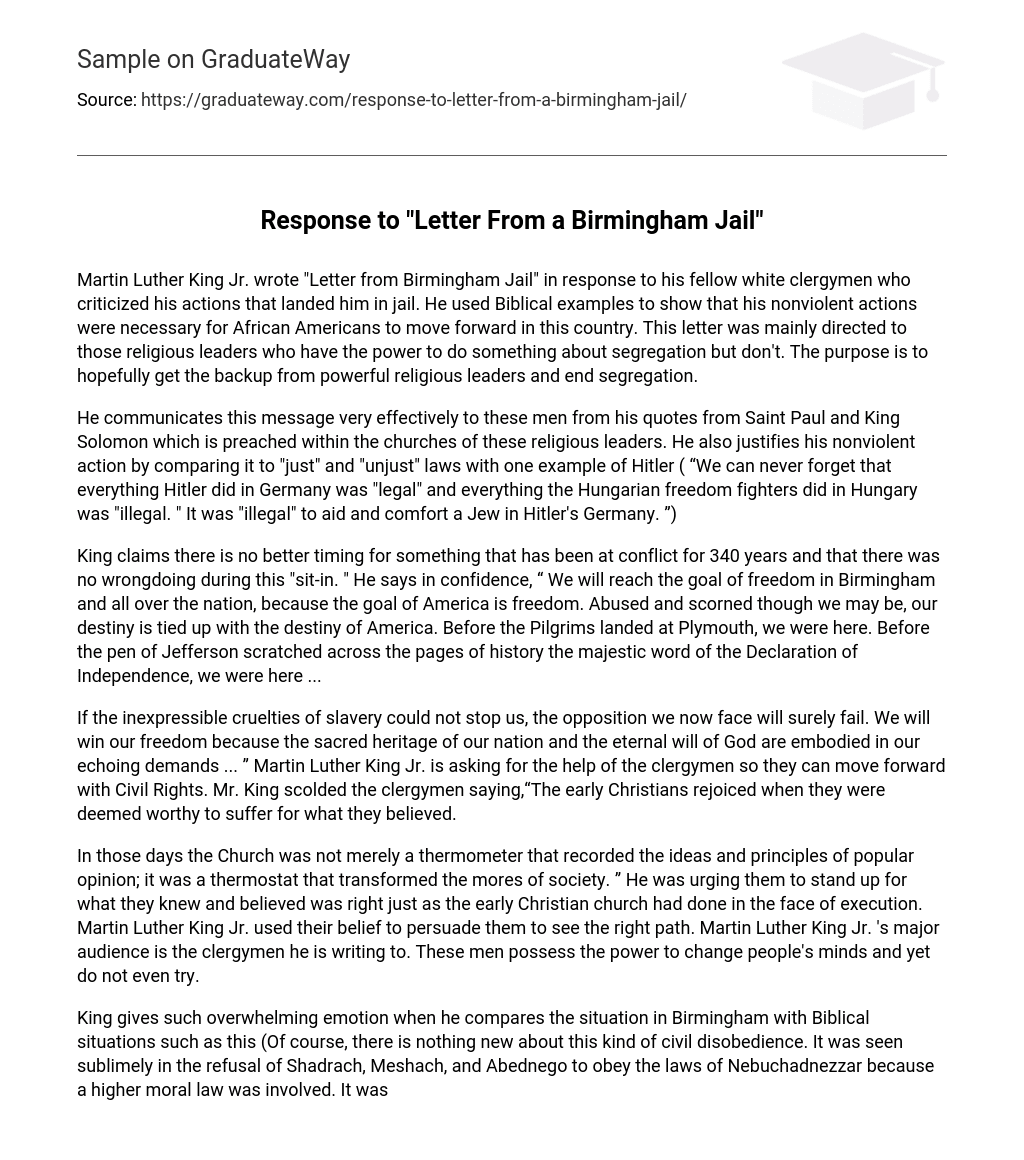Martin Luther King Jr. penned the influential “Letter from Birmingham Jail” as a response to criticism he faced from white clergymen following his arrest. In this letter, King employed biblical allusions to underscore the significance of nonviolent measures in advancing African Americans’ cause in America. The main addressees of this missive were religious leaders who possessed the authority to tackle segregation but chose not to act upon it. Its aim was to garner backing from influential religious figures and ultimately bring about an end to segregation.
The speaker effectively conveys this message to the men by sharing quotes from Saint Paul and King Solomon, which are preached in the churches led by these religious leaders. Additionally, he supports his nonviolent action by drawing a comparison between “just” and “unjust” laws, using the example of Hitler. He emphasizes that everything Hitler did in Germany was considered “legal,” while the actions of the Hungarian freedom fighters in Hungary were deemed “illegal.” He further illustrates this point by noting that aiding and comforting a Jew in Hitler’s Germany was also considered “illegal.”
In his argument, King asserts that after 340 years of conflict, there is now a moment to address it and denies any wrongdoing during this “sit-in.” He expresses confidence that freedom will be attained not only in Birmingham but also across the entire nation, as it is America’s fundamental objective. Despite enduring mistreatment and ridicule, our destiny is connected with that of America. We have existed even before the arrival of the Pilgrims at Plymouth and prior to Jefferson writing the remarkable words of the Declaration of Independence…
Martin Luther King Jr. appeals to the support of clergymen in order to advance Civil Rights, asserting that if the horrors of slavery did not deter them, then their current opposition will also fail. He emphasizes that their fight for freedom is rooted in the sacred heritage of their nation and God’s unwavering will, which are echoed in their persistent demands. Mr. King criticizes the clergymen by reminding them that early Christians found joy despite suffering for their beliefs.
Martin Luther King Jr. appealed to the clergymen in his letter, emphasizing the transformative role of the Church. He compared the Church to a thermometer that merely reflects popular opinion, and contrasted it with a thermostat that has the power to shape society’s values and beliefs. He encouraged the clergymen to take a stand for what they believed was right, drawing inspiration from the early Christian church’s resistance against persecution. King recognized the influence of these clergymen in changing people’s minds, yet expressed disappointment in their failure to utilize their power effectively.
King’s comparison of the situation in Birmingham to Biblical situations is incredibly powerful. He notes that civil disobedience is not a new concept and references the refusal of Shadrach, Meshach, and Abednego to obey Nebuchadnezzar’s laws because they believed in a higher moral law. Additionally, he mentions how early Christians were willing to face dangerous situations such as hungry lions and execution rather than submit to unjust Roman Empire laws.
) King attempts to clarify that occasionally, in order to stand for righteousness, one must be willing to undertake perceived wrongdoings that society might unjustly label as such. At the commencement, his tone is highly proficient and respectful, enabling the listeners to attentively consider his message. As the text progresses, King progressively becomes more assertive and resolute while maintaining his politeness. He presents himself as a member of the clergy, yet one who must surpass numerous hurdles faced by the ordinary African American.
Presenting himself as a friend, he simultaneously critiques religious leaders and urges them to reconsider their stance on Civil Rights. A noteworthy quote emphasizes that using unethical means to achieve virtuous goals is wrong, but it is possibly even more erroneous to use ethical means to uphold immoral results. This quote suggests that resorting to coercion and violence for positive outcomes is unjustifiable, yet remaining passive and allowing immoral actions to persist is equally unacceptable.
“Injustice anywhere is a threat to justice everywhere. We are all connected, and our destinies are intertwined. What impacts one person directly, impacts us all indirectly.”
According to Martin Luther King’s statement, even if the current situation doesn’t directly affect you, it will eventually loop back and include you. Therefore, the most effective approach to address injustice is to promptly eradicate it and prevent its harmful effects on anyone.
It is unethical to encourage individuals to give up their defense of their constitutional rights as it may lead to violence. Society has a responsibility to support those who have been victimized and punish the offenders. However, the clergymen in Birmingham chose to be inactive and indifferent towards the increasing problem of slavery. Dr. Martin Luther King Jr. urged them to utilize their influence over the people and communities they preached to. He believed that society must safeguard African Americans from racism and take action against those who hold racist beliefs.





